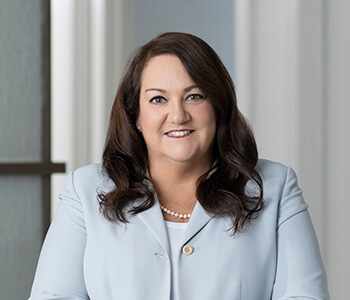A common misconception about estate planning is that it only impacts what happens when you pass away. While that is often the focus, it can also include decisions that affect you during your life, such as who will make medical and financial decisions for you if you cannot. Your estate planning needs may change throughout your lifetime. We work with families with various estate planning needs, from simple to complex plans. We work to understand your goals and needs. We can review your existing documents, prepare new documents, or update your current documents when necessary.
Our attorneys consult with you to review the contents of your estate, discuss your goals and objectives, and evaluate any special needs or unique circumstances you may have. We provide advice in choosing executors, trustees, guardians, agents, and representatives. We also counsel you on developing a plan to manage your estate during your life and upon death in accordance with your wishes. The three most important documents to any estate plan are Last Will and Testaments (sometimes referred to as “Wills”), financial powers of attorney, and medical powers of attorney or living wills.
Our attorneys frequently deal with other issues in estate planning, such as tax planning, guardianships for minors, guardianships for incapacitated adults, and special needs of family members with a disability. Our attorneys stay current on the most recent changes to the law and how those changes will affect our clients’ estate plans.
Asset Protection
Our attorneys understand that asset protection is an important part of estate planning for our clients. Preparing a comprehensive asset protection plan as part of your estate planning will allow you to minimize tax liabilities, protect against creditors, plan for long-term care, and protect your legacy. Our experienced estate planning attorneys will help you to develop asset protection strategies that are tailored to your unique goals.
Business Succession Planning
Our firm has a long history of representing business owners and entrepreneurs. Succession planning is a complex process involving tax planning and family dynamics. Our estate planning attorneys coordinate with members of the firm’s other practice areas and the client’s other professional advisors to create the best plan for our client and their families. Ensuring a successful transition to a new owner or the next generation of owners can protect your business assets for you and your family’s future.
Power of Attorney
A financial power of attorney allows another person you trust to stand legally in your shoes in carrying out a multitude of financial transactions . Such transactions include writing checks, making withdrawals and deposits from bank accounts, transferring your personal or real property, executing legally binding documents, paying bills, making gifts, creating trusts, and pursuing legal claims. Our attorneys will explain the responsibilities and limitations your financial power of attorney will have and will help to ensure your financial affairs are in order.
Guardianships
Sometimes an individual will become incapacitated before he or she has a chance to execute any powers of attorney, or occasionally those powers of attorney fail. In such cases, our attorneys will guide clients through the process of becoming a guardian of such an incapacitated individual so that the guardian can make legal, financial, and health care decisions for on their behalf.
Healthcare Power of Attorney / Living Wills and Advanced Healthcare Directive
As part of our comprehensive estate planning approach, our attorneys guide our clients through preparing Healthcare Power of Attorney and Living Wills so that their wishes are known if they cannot make medical decisions for themselves.
The Healthcare Power of Attorney and Living Will are typically combined into one document. In the first part, known as the Healthcare Power of Attorney, you nominate an agent authorized to make certain medical decisions on your behalf when you cannot. Such decisions include authorizing or withholding medical procedures, approving admission or discharge from a medical facility, and hiring or firing medical personnel. The second part, known as the Living Will (or sometimes an Advanced Directive), becomes effective if doctors find the patient to be in an end-stage medical condition or permanently unconscious. At that point, the Living Will spells out medical treatments you would or would not want to be used to keep you alive if there is no realistic hope of recovery. It also can detail decisions regarding organ donation and burial/funeral wishes. Our estate planning attorneys will explain each of these documents in detail and provide information about your options.
Long Term Care Contract Review
Entering long-term care can be a stressful time, and the contracts can be confusing. For our clients, we understand that reading through the fine print of a long-term care contract may not be their primary focus when dealing with a family member who requires long-term care. Because these contracts can impact a person’s health and finances long-term, they should be carefully reviewed before signing. Our attorneys are experienced at reviewing long-term care contracts and looking for pitfalls that may have negative ongoing implications for our clients.
Medicaid Planning
Due to the rising cost of healthcare, Medicaid planning is becoming an increasingly common element of many estate plans. Careful Medicaid planning helps people ensure their access to quality medical care when they get older. However, it is a needs-based program, and qualifying for coverage can be a challenge for many people. The attorneys at RKG Law can help you navigate this complex area of the law so that you understand the options available to fit your specific needs.
Planned Giving
Planned giving, as a vital aspect of estate planning, offers individuals the opportunity to leave a lasting impact on charities and nonprofit organizations close to their hearts. While the benefits of planned giving include reducing tax liabilities, the complexity of navigating charitable giving strategies often necessitates the guidance and expertise of an experienced attorney. RKG attorneys can assist you in identifying the most effective planned giving methods tailored to your specific financial and philanthropic goals. They provide invaluable insights on tax implications, charitable trust formation, structuring bequests, and other legal considerations to ensure your intentions are carried out smoothly and in accordance with the law. We will work with you to maximize the impact of your charitable contributions while ensuring your estate plan aligns with your overall objectives.
Special Needs Trusts
Many people with disabilities qualify for government benefits; to do that, they may need a Special Needs Trust (also called a Supplemental Needs Trust). Two main types of Special Needs Trusts exist: first-party (self-funded) and third-party. Our attorneys can assist in forming either type of trust and counsel our clients on the most appropriate. The two keys to an effective Special Needs Trust are: (1) to provide a pool of resources for the benefit of the special needs individual who, in many cases, may not be qualified to manage those resources and (2) to prevent the special needs individual from being disqualified from receiving government benefits. We use our expertise to assist our clients in drafting an appropriate special needs trust and to counsel trustees on how to serve as a trustee of a special needs trust without jeopardizing the beneficiary’s qualification to receive benefits.
Trusts
Trusts are flexible legal tools that can be formed to carry out many purposes, as such, there are numerous types of trusts. Some trusts care for money given to a minor, while others provide for the ownership, enjoyment and dispersal of property until certain conditions are fulfilled or to protect property should the owner become incapacitated. Certain trusts, such as revocable living trusts, can prevent the need for ancillary probate when you own real estate outside of Pennsylvania. Other trusts can help reduce federal estate tax. Our attorneys can guide you in selecting and drafting the appropriate form of trust to suit your estate plan.
Wills
When most people think of estate planning, they most often are thinking about a Will. A Will not only distributes a person’s assets after their death, it can also serve other purposes. For example, a Will can name the guardian of any child under 18, create trusts for minor children, and name executors, trustees and other fiduciaries. It is important to understand the various elements that can be included in a Will to manage your estate after your death and to ensure your wishes are followed. Our attorneys will draft your Will in accordance with a comprehensive estate plan and provide you with peace of mind that your intentions will be fulfilled.
Transfer of Assets
Depending on your goals and particular circumstances, setting up beneficiary designations on your accounts might make sense – in some cases, that might mean not probating your Will, which may or may not be best for your situation. In other cases, transferring assets during your lifetime might simplify the administration of your estate or minimize the tax consequences. However, it is critical that clients discuss their goals with an experienced estate planning attorney to ensure these assets are transferred correctly – a simple mistake can undo your careful planning. The estate planning attorneys at RKG Law have extensive experience in the transfer of assets.


















